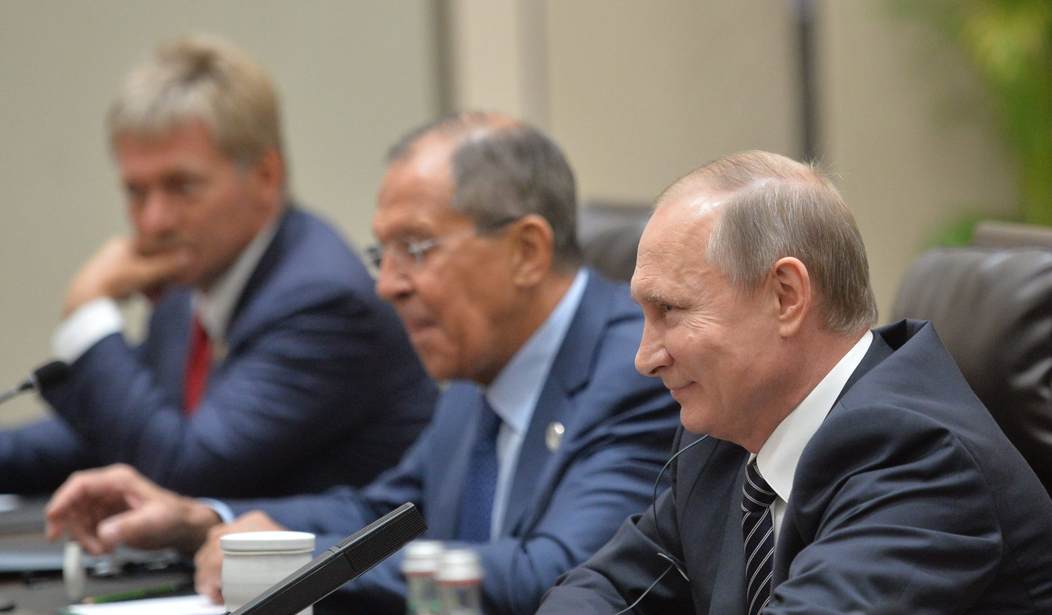WASHINGTON – James Woolsey, former CIA Director in the Clinton administration, said no one should be surprised that Russia has “asserted” itself in Syria because President Obama backed away from the “red line” ultimatum that he gave Syrian President Bashar al-Assad over his use of chemical weapons and made the U.S. “look weak.”
PJM asked Woolsey about Russian news outlets urging Russian citizens to locate their nearest bomb shelters as well as recent comments made by Russian Ambassador Sergey Kislyak, who said relations between the U.S. and Russia are at their lowest point since the Cold War.
“I think it’s a very serious situation with Russia. They may be exaggerating it a bit in order to try to lean on us. They have had good luck leaning on President Obama and getting a warm water port in the Mediterranean — running the relationship with Iran and Syria,” Woolsey told PJM after a seminar on “The Fifteenth Anniversary of 9/11: Past Lessons and Future Outlook” held at the Potomac Institute for Policy Studies.
“By backing down from his red line and not wanting the Assad regime to use chemical weapons against its own people, and then when they went ahead and did it President Obama sort of said, ‘oh, well, OK, I’ll erase my red line and hand the problem to Russia.’ So it should not be surprising to people that Russia is asserting itself in this part of the world. The way Russian governments decide to assert themselves is when their opponents look weak. President Obama has made us look weak so it could be a serious problem. I don’t know how serious or if it’s being exaggerated,” he added.
Woolsey is a member of the Trump campaign’s national security advisory council but he declined to speak directly about the presidential race.
“I’m part of the transition work for Trump’s campaign and I don’t deal with questions about the election or the politics of it,” he said.
In the second presidential debate, GOP nominee Donald Trump and Democratic nominee Hillary Clinton sparred over the best approach toward relations with Russia.
“I’ve stood up to Russia. I’ve taken on Putin and others, and I would do that as president. I think wherever we can cooperate with Russia, that’s fine and I did as secretary of State. That’s how we got a treaty reducing nuclear weapons,” Clinton said. “It’s how we got the sanctions on Iran that put a lid on the Iranian nuclear program without firing a single shot. So I would go to the negotiating table with more leverage than we have now. But I do support the effort to investigate for crimes, war crimes committed by the Syrians and the Russians and try to hold them accountable.”
Trump said, “It would be great if we got along with Russia because we could fight ISIS together, as an example.”
Trump went on to criticize Clinton’s comments.
“Now, she talks tough, she talks really tough against Putin and against Assad. She talks in favor of the rebels. She doesn’t even know who the rebels are. You know, every time we take rebels, whether it’s in Iraq or anywhere else, we’re arming people and you know what happens? They end up being worse than the people,” he said.
Woolsey was asked if standing with Russia side-by-side in Syria to fight ISIS would be the right approach or if the White House should get tough on the Russian government.
“It’s much more complicated than that – it’s something that’s got to be continually assessed and the circumstances and reactions assessed and so forth, so they might have some good Russian experts inside the U.S. government but I think the White House has been making far too many decisions based on public relations,” he said.
When asked about the steps the U.S. government has to take to defeat ISIS, Woolsey said, “We have to destroy ISIS in its home caliphate in Iraq and Syria and then we’ve got to work with a lot of other countries to help them in the way they use data — all sorts of things — to help them figure out how to defeat ISIS at home, for them, at home, because it’s a serious problem and it will be for years.”









Join the conversation as a VIP Member